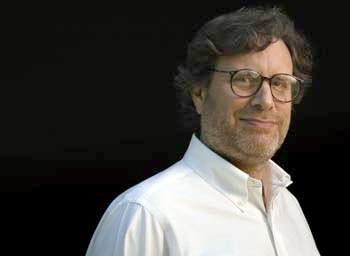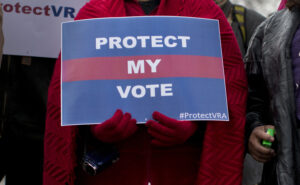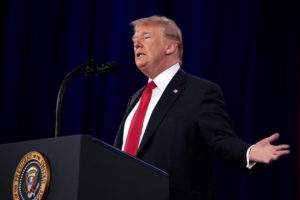Danny Goldberg on Antiwar Artistry
The former Air America CEO and music mogul discusses the significance of the Dixie Chicks' Grammy win; Al Gore's prospects for 2008; and the liberals' responsibility to "blow the wind" of change.
The former Air America CEO and music mogul discusses the significance of the Dixie Chicks’ Grammy win; Al Gore’s prospects for 2008; and the liberals’ responsibility to “blow the wind” of change.
Listen:
(running time: 25:25 / 23.3 MB)
Full Transcript:
James Harris:
This is Truthdig. This is James Harris, sitting down with the usual suspects: Bob Scheer and Josh Scheer, and we also have on the phone a distinguished guest, Mr. Danny Goldberg. He’s a revolutionary — one of the people who led the fight against record censorship in the ’80s. Former CEO of Air America, but now Danny is the president of Gold Village Entertainment, and we have the pleasure of talking to him on the heels of the Dixie Chicks winning five Grammys. And if you don’t know, some of you might have heard about the frenzy they caused when they spoke out against President Bush. They spoke out against our position — our potential position — in Iraq. And they seem, with their title track, “Not Ready to Make Nice,” they seem to have captured the spirits of America, because they’re not just going to do what everybody wants them to do. They’re not just going to follow what the president says is right. And in the spirit of patriotism, that’s an important message.
If you go to Truthdig.com, you can see where the Dixie Chicks have been granted and given an award by the ACLU. The quote [from Natalie Maines] says, “It hasn’t taken courage to stand strong, just a first-grade education” to figure out some of the things that are going on in Iraq, some of the things that the president and the former [Secretary of Defense] Mr. Rumsfeld and Mr. Cheney, some of the things they’re telling us, they’re not right.
Danny, welcome to Truthdig, first of all. I just want to ask you, what are your feelings? Do you feel any redemption in the fact that the Dixie Chicks have just won this national award and have been seemingly embraced by the American public?
Danny Goldberg: I think it’s certainly good for the country and good for the Dixie Chicks. In general, I think back to — in 1949 the Weavers had a No. 1 record with “Good Night Irene.” Within three years the blacklisting that had affected them because of their supposed communist sympathies had made the group break up. It was another 15 years before Pete Seeger could be on national television or really have any kind of commercial activity. And I think it’s a refreshing contrast that in this era, they did take a shot, they lost a lot of exposure on country radio, because Natalie Maines said she was embarrassed to be from the same state as President Bush. And their sales in records and concerts were not as big as they were during their apex, but they did sell a couple of million albums, and the Grammy voters — which includes people from all different kinds of music — were making a statement that they don’t like it when right-wing talk show hosts or apologists for any particular kind of government tries to intimidate artists. A similar thing happened in last year’s Grammys. My client, Steve Earle, took a lot of grief for his song, “John Walker’s Blues,” and for his own antiwar views, and he won a Grammy in the contemporary folk category. So I think there’s an atmosphere, culturally, that is more protective of artists, and a public that will give them a little more license than existed in previous years — even though [the Dixie Chicks] were damaged by the attacks, even with the Grammys.
Robert Scheer: Yeah, Hi, Danny. It’s Bob Scheer.
Goldberg: Hi, Bob.
Robert Scheer: Hi. Hey, listen, I think you should be making more of this. I just feel what they did took more courage in a way than almost anything I had seen in my lifetime … not just from artists, but from academic people, what have you. I mean, this was coming after 9/11, and I know a lot of people were silent, and for them to take the stand — but more important, and you could tell us about this, they must have gotten a lot of advice after that, as they say in their lyrics, “Shut up and sing.” We know they were blocked out of certain radio stations. And there was a lot of feeling that they would be destroyed. And the fact that they stuck to their guns and then came out with this album, saying, “No, I’m not going to make nice, and I’m going to stick to this,” I just don’t think I’ve seen that kind of — I think it took more courage than what John Lennon did, what Bob Dylan did, I really do.
Goldberg: [Laughing] I don’t think it took more than John Lennon —
Harris: More than John Lennon?
Goldberg: I think John Lennon certainly had an equal amount of courage; and paid a pretty steep price. There’s a pretty good movie about the Nixon administration’s response.
Robert Scheer: It’s a very good movie.
[Crosstalk]
Robert Scheer: It’s a very good movie; but at the time — let me just push it a little bit, Dave, because I’m not taking anything away from him or anyone else. But this was — I thought when they did that, they would be destroyed, and you’ve been a big record executive — what, Warner Records?
Goldberg: Yeah, Warner Records.
Robert Scheer: So you know about that whole world. Tell me about the pressure they must have come under, and what these stations can do when they’re not going to play your music, and how they can destroy people.
Goldberg: I think that there’s different — it’s not a monolithic environment. The country radio stations stopped playing them overnight. And to this day they don’t get hardly any exposure on country radio stations. Country radio clearly looks at cultural conservatives and political conservatives as a key part of their audience. We’re affected by the right-wing talk show type of attacks. And that hurt them with a big part of their audience. Their manager, Simon Renshaw, certainly stood by them 100 percent of the time. And their record company didn’t drop them. The record company got a new producer, Rick Rubin, who made this record that sold a couple of million albums. You know, I think it’s important to take note that there was a number of people in the business that in fact were not intimidated. It wasn’t only the Dixie Chicks who I think deserved 100 percent of the praise you’ve giving them. But there were also a number of people in the business who didn’t walk away from them. And in previous years, in the blacklisting period, for example, corporations were much easier to intimidate. There are good and bad things about capitalism, but the current era does present an environment where the desire for profits and everything often trumps these things.
So they did get enough support to make the record, to get it distributed, to get it very well produced, to get it marketed, to sell a couple of million records, and to win the Grammy. So it was not only them, it was a subculture within the entertainment business that was not chicken. And that’s an improvement over previous eras of things. It was particularly risky for the Dixie Chicks, because they were coming from country music. There were a number of artists that criticized Bush: Pearl Jam did, and a number of hip-hop artists and other rock artists. But it was more gutsy for country artists because of the influence of country radio on access to part of their audience. And they paid a price for it. And they still don’t have the level of audiences — even after the Grammys — as they did during their peak five years ago. But they’ve kept two-thirds of it as a result of the support of the rest of the media, and mainly because a lot of people like their music. But there is a system that allows them to get their music to people that there was not … in the ’50s and ’60s.
Josh Scheer: Now, Danny — This is Josh Scheer. How’s it going?
Goldberg: Good.
Harris: Now, do you think they’ve reached new markets? I mean, before, they were just a country act, but now, because of this, maybe they’ve reached more people than they would have just being from country radio.
Goldberg: I think that the Grammys is a wide enough telecast where people who are fans of all different kinds of musics watch it, that undoubtedly the Grammys put them in touch with some people who might not have focused on them. From the beginning, the Dixie Chicks were a little different from most country hits. They were a little more roots-oriented; they were a little more individualistic. And that was part of what gave them success, and all that. I don’t think people embrace a musical artist just because they like their politics, though. I think if you don’t like their music you may say they have great politics, but I don’t particularly want to listen to their music. Primarily people listen to music because they like the music. Then there are people who listen to the music even if they dislike the politics. I remember there was a tour that went out just before the election in 2004 that included Springsteen, the Dixie Chicks and other people, and there were a lot of anecdotal reports of people saying, “We hate John Kerry; we don’t agree with this, but we love their music.” So that phenomenon exists. But there’s a group that will really reject an artist because they hate their politics, and that happened in some parts of the country subculture. But I think they’ve really reached a connection with millions of people, of an audience that is pretty unbreakable. And it’s an encouraging development, because in other eras, political reactionaries have been able to damage artists in a way that the Dixie Chicks were not as badly damaged.
Robert Scheer: Yeah, Danny, this is Bob again. But let me just throw in one last point on this. It was interesting: When I interviewed Michael Dukakis for the L.A. Times, and he said he was a “card-carrying” member of the ACLU, it may have destroyed his campaign. Here on Truthdig we have the speech that was given by [Natalie Maines] at the ACLU dinner, where she said [paraphrasing], “Well, if that makes me a liberal, well, I’m proud of it.” So she used the L-word, which very few people are willing to use anymore. And she said, “I’m a card-carrying member of the ACLU.” Now, as a guy who has devoted a lot of energy to the ACLU, that must have been quite thrilling. People should go check out this video, because I thought it was just great.
Goldberg: Of course the ACLU, particularly in Southern California under Ramona Ripston’s leadership, has had an extraordinary ability to connect with all different kinds of people, and I love it when people who are very popular acknowledge [the ACLU’s] importance. Obviously there’s a difference between running for president, where you have to get 51 percent, more or less [laughs], [and] being an artist, where if you have three or four percent of the public loving what you do you’re extraordinarily successful. So it’s a totally different example — apples and oranges. But I think that it’s exciting that people who come from country music, which is traditional music and has a lot of popularity in the South and so-called red states, are able to proudly be liberal. Garth Brooks was very liberal, and wrote the songs about gay rights. There’s always been a liberal strain within the country world, and it’s something politicians should take notice of when they otherwise get intimidated by the Pat Robertsons and Jerry Falwells of the world.
Robert Scheer: You know I really don’t know what I’m talking about when I talk about country music, but Josh here, we spend some time with Willie Nelson in Hawaii; and Josh did an interview with Annie Nelson about biodiesel, and I was amazed at how sharp a view they had of what’s going on in the country and the economy and everything. Did you have any dealings with them on that issue?
Goldberg: I don’t know Willie Nelson particularly well. I’ve met him briefly. He’s very, very progressive. I think he campaigned last time around for Dennis Kucinich. But he’s not a country artist. He’s someone from country roots; he hasn’t been played on country radio hardly for the last 15, 20 years. He was a big country songwriter in the ’70s, and he’s an icon to his fans, but in terms of the current country radio world, that’s not where his audience is. So I think he’s a genius and incredibly progressive politically, but it was not risky for him the way it was risky for the Dixie Chicks.
Harris: Danny, we’re going to change the page just a little bit here. I know you’ve been outspoken about the fact that when Tipper Gore attacked Prince for that line in “Darling Nikki”: “I knew a girl named Nikki / I guess you could say she was a sex fiend.” Can you finish that line?
Goldberg Well, I know she was masturbating with a magazine. I always drop a few words in that line, because I focus on the dirty part.
Harris: What was it about that action, that Tipper Gore, the Democrat, the wife of the Democrat, that you say kind of marked the beginning of a kind of sour relationship between Democrats and younger kids, or kids who like to listen to music that at least made them move and shake?
Goldberg: Well, first of all, that was a long time ago, and I wish Al Gore would run for president now. I don’t think we’re likely to have those kinds of problems with the Gores relative to pop culture today. But I think it was a mistake at that time, in the ’80s for Democrats, and I think it was a mistake for Al Gore in his 2000 campaign with Joe Lieberman to attack pop culture, because when they end up attacking obscene or violent lyrics or movies, what they’re usually attacking is what young people like, and particularly African-American culture, because there is an awful lot of violence in Shakespeare and the Greek tragedies and opera and so on. It’s always culturally biased. Younger people are definitely a constituency group that Democrats and liberals can look towards. In 2004 I think Kerry won people under 30 by seven points and he lost people over 30 by eight or nine points. In the midterms I think it was an even greater margin for the Democrats. And the proportion of younger people who vote has been rising. It’s still not as high as it should be; it’s still not equal to older people, but it is increasing — a lot of it, I think, because of the war and the fact that young people are the ones dying in the war, and I think if there’s going to be any kind of Democratic or progressive majority, it has to include younger people, and avoiding insulting or demeaning their cultural tastes is probably a good idea. But in fairness, that was more of a problem in the mid-’80s, late ’80s. But 2004 and 2006, I think the Democrats have learned not to do that.
Harris: I agree, and you spoke of Al Gore being a good candidate right now. Rolling Stone just released an article in its latest issue about how good a candidate this guy would be; I mean, he’s sat in the White House. Why do you think he’s not going to run, or do you think there’s a possibility he might dust off the costume and run?
Goldberg: You know, I can’t read the guy’s mind. It’s an incredible price you pay to run for president. If he doesn’t run, obviously he’s always going to have this halo effect. If he runs and loses, he’ll be a two-time loser. He may just temperamentally not want to go through the process; he knows exactly how toxic it is. I think it is a very particular kind of person who’s got the makeup to actually get through that process, and I have no idea what he’s going to do. But I do agree with the Rolling Stone article, and I do think he would be at this time an ideal candidate. But they have some other good candidates, too.
Harris: Who’s your top choice right now?
Goldberg: Other than Al Gore?
Harris: Other than Mr. Gore.
Goldberg: Other than Al Gore I quite like Barack Obama because I think he knows how to communicate with people, and I think communication is a big part of the job description of being president.
Harris: Do you think it’s going to come down to his blackness or his experience? Do you think he’s got a chance in hell to win, or will he end up like the black candidates who pull one percent, two percent? You know, the Sharptons of the world.
Goldberg: Well, Jesse Jackson did a lot better than one or two percent. I think that, I don’t know, I guess he’s got to make a big impact in Iowa and New Hampshire to prove that he could win. You know, Hillary Clinton has a pretty convincing rationale herself for president. She lived in the White House for eight years, she’s got a lot of money and a lot of organization. There are a lot of people who like John Edwards. I just don’t know. I certainly think Barack Obama is going to be seriously considered. He’s got a tremendously high profile, his books have done incredibly well, he’s an eloquent speaker, and he was right on the war early, which the other candidates who are running currently were not.
Robert Scheer: Wait, wait, wait: With the exception of Dennis Kucinich.
Josh Scheer: And Ron Paul.
Goldberg: I agree. Dennis Kucinich’s position on the war has been exemplary and conforms with my own. I don’t believe Dennis Kucinich has as plausible a chance of getting the nomination as Barack Obama does.
Robert Scheer: I think Barack Obama is going to be the vice presidential candidate no matter who wins.
Goldberg: Right.
Robert Scheer: And I think, aside from race, hard for breaking through that ceiling, I think the experience issue is important. But I agree with James that he has not taken a much clearer position now in opposition to the war than Hillary has, and setting a deadline, which she’s not willing to do. One of the surprises I’d like to ask you [about], because you’ve been politically involved, is Edwards. He seems to me the clearest on all the issues. Why aren’t we talking about him more?
Goldberg: I don’t know. He’s a very impressive guy, and a lot of my friends, particularly in the labor movement, are very, very impressed with him, and he may be good. I don’t, there’s a little bit of a robotic quality to him that has never connected with me emotionally when I’ve seen him on television. Ultimately I think a big part of the job description of running for president or being president is being effective on television. But he’s a serious guy who’s got a very strong base in Iowa who may emerge as the nominee. Again, I don’t pretend to be a pundit or someone who knows what happens in Iowa, but as someone who watches television and who thinks that Democrats have produced people who aren’t very good on television, I think that Obama has a real advantage there, and it might be enough; but it might not be. And Edwards could beat everybody. He’s been through the process, he’s been all over the country, he’s I think got a coherent platform and point of view. He also doesn’t have much experience. He served one term in the Senate, so if that’s a factor, I don’t think his experience is better than Obama’s.
Josh Scheer: Now, this is Josh again. I want to go back to a point with the ACLU, because we got off that a little too quick. We talked about it being a progressive organization, a liberal organization. I think we feed into the O’Reilly “the secular progressives are running everything [line].” People should be reminded, this is an organization about rights. It’s a libertarian organization. Conservatives can like this organization. I think that’s an important point to make. I don’t want to feed into this O’Reilly “this world is being run by liberals” [line].
Goldberg: Well, O’Reilly is certainly not one of my favorites. He went on television and publicly cheered when I left Air America, and bad-mouthed Air America 43 times, literally, during the first two years it was around. But first of all, there are libertarians, certainly, who believe in the ACLU, and certainly who believe in civil liberties. And the ACLU has litigated on behalf of the Nazis, Oliver North — anybody whose rights they believe are violated, without regard to their political position. But historically, it’s been a home for a lot of liberal thought, and I think it’s silly to pretend otherwise. I don’t think the underlying principals are liberal or conservative, but I do think if you really look at the history of it, and the issues that have animated it, I think it’s served, it’s been more useful to liberal ideas than conservative ideas, even though, by concept and behavior they are very even-handed about the idea that conservatives as well as liberals or anyone else has rights.
Harris: I got one final question; I know you have to go. You’re a record executive, you have to go.
Goldberg: Well, I’m mostly a personal manager of talent now. I spent many years as a record executive; my current phase is back to my roots as representing artists.
Harris: So I know you have to do lunch somewhere.
Goldberg: It’s after lunch. I’m in New York now.
Harris: Here’s a thought: Democrats seem to lack cojones. They lack any real stick-to-it-ness. And I’m going to give you an example of why I’m saying that. I want some feedback from you on this point. You take Air America; now you’re gone from that network. My concern about that network always was that it’s a liberal network with a similar message. In other words, the day-to-day never really changes greatly. So we’re going to be bashing Bush today and tomorrow we’ll bash Bush. Perhaps it could be said that the Democratic Party is the same way: They really don’t have the cojones of a Rush Limbaugh. They really can’t get after you like an O’Reilly. They are so interested in everybody getting a fair share, and kind of having a place at the table, that nothing ever gets done. Perhaps that’s the reason we can’t mount an effort against a man who is dead set on going into Iraq and Iran, dead set on continuing his war. Do you think there’s a relationship between the mentality of a network like Air America and the mentality of Democrats in office right now? Why can’t they do anything to hinder the efforts of George Bush, though there were clearly Republicans able to hinder the efforts of Clinton when he doing what he did?
Goldberg: Air America had its own weirdness that deserves to be treated separately. I wouldn’t say that its problems necessarily relate to the problems of liberalism or Democrats in general. But I don’t know; I think the Democrats did just win a congressional election; I’ve never been a fan of mainstream Democrats. I’ve always been to the left of them. I’m a Bob Scheer ideologue myself. But I think that they did just win a congressional election, I think it’s really hard to when you don’t have the White House, to take leadership on issues of foreign policy, and that those words commander in chief could be interpreted different ways by constitutional scholars. But there’s something about that fact that’s not so easy to overcome. I think when Clinton was president, he more or less did what he wanted. They embarrassed him and they humiliated him, and all this sort of thing. But he did more or less what he wanted in the Balkans and elsewhere. We could wish he did different things, whether it was in Rwanda or elsewhere, but I think he was able to pretty much conduct foreign policy. You need a different president. And those elections come every four years. We had the wrong campaign and the wrong candidate last time, and hopefully we’ll have the right campaign and candidate this time. But I think what matters more than Democrats are shows like yours, websites like Truthdig, activist organizations like the ACLU, the activity of the bloggers. Because the good presidents, when I was a kid, my parents didn’t think John Kennedy was so great when he was running, but he was a middle-of-the-roader, his father had been a right-winger. But when he got elected there were winds blowing in the country towards civil rights, for a test ban treaty. Roosevelt wasn’t such a great governor of New York, but when he got in, there were winds blowing from unions and from socialists. To really affect what presidents do and what Democrats do, you’ve got to be a force on the left through things like what you’re doing, the way that the right wing, through people like Pat Roberston, Rush Limbaugh and Jerry Falwell are. That’s where the intellectual energy comes from. Politicians go with the wind, and our job is to blow the wind.
Harris: Well said. I think we’ll stop there. Mr. Goldberg, thank you so much for stopping by.
Goldberg: Thank you so much for having me.
Harris: Maybe again in the near future we can talk politics again on Truthdig.
Goldberg: OK. God bless. Bye.
Harris: For Bob Scheer, for Josh Scheer, this is James Harris, and this is Truthdig.
Your support matters…Independent journalism is under threat and overshadowed by heavily funded mainstream media.
You can help level the playing field. Become a member.
Your tax-deductible contribution keeps us digging beneath the headlines to give you thought-provoking, investigative reporting and analysis that unearths what's really happening- without compromise.
Give today to support our courageous, independent journalists.






You need to be a supporter to comment.
There are currently no responses to this article.
Be the first to respond.